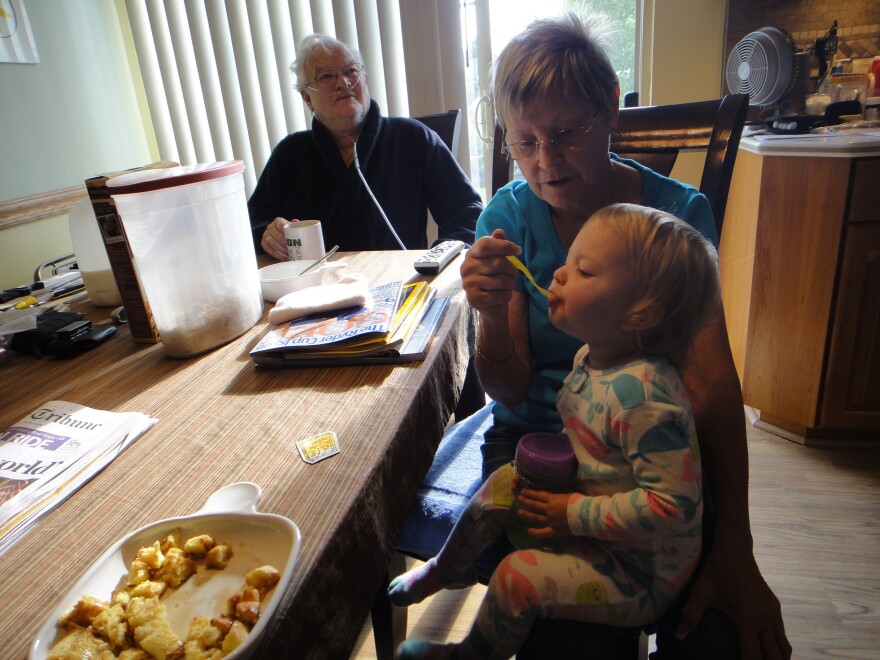Salt Lake County Aging Services is offering a new series of classes for those who take care of elderly family members in their home. It’s called Caregiver Academy. This evening, the Academy is offering a class geared to help those dealing with Alzheimer’s Disease and dementia. This story looks at the particular challenges and needs of family caregivers.
Morning is a busy time at Myrna Griffith’s home in West Valley. She’s got to get breakfast on the table for her great grand-daughter Grace. Her 15-year old dog – a small but noisy pug - has to be carried outside because his legs don’t work. And then there is her husband Ron sitting at the kitchen table in his bathrobe.
Ron has Alzheimer’s disease along with other health issues. He’s a survivor of prostate cancer. He has diabetes. He wears a pace maker because of a heart condition, and he needs an oxygen tank to breathe properly. Every day, Myrna weighs him to see if he is retaining fluid. She checks his blood pressure and his oxygen levels.
“Are you still having trouble breathing?” Myrna asks her husband. “No,” says Ron, “I’m having trouble liking you.”
Myrna pricks his finger to test his sugar levels. She gives him insulin injections in the arms and stomach. She reminds him to take his inhaler, though he often resists. And he takes 13 pills through the course of the day.
“Our biggest hassle right now is he’s more verbal,” says Myrna, “He doesn’t want to be interrupted. He doesn’t want anyone to do anything for him. That’s a hard level that we’re at right now. Sometime it can be strong words and emotional. It’s a battle every day.”
After everyone is down for their late morning naps, Myrna gets a chance to sit down. She is about to turn 70 years old; she retired retired early to take care of her husband. It’s not the life she had planned.
“You get some resentment because you’re giving up the things you enjoy doing to then get nagged at when you’re trying to help somebody,” said Myrna, “Physically I’m not run down. Emotionally I am run down at times, and I think that can be harder on you.”
Myrna says she has considered putting her husband in a home, but she wants to take care of him as long as she is able.
“Even though I get frustrated, and you’d like to be through with it, you don’t. It’s your loved one,” said Myrna tearfully, “There are days that I think – do I hate him because of what I have to go through with him? Because you get to that point; you don’t love that person for a while.”
Salt Lake County Aging Services estimates there are 175,000 people like Myrna Griffith caring for an elderly family member in their home. Caregiver Training Specialist Kathy Nelson says many long-term caregivers are at risk for what she calls compassion fatigue.
“Doctors, police officers, care professionals can face this as well. You can no longer stand to be compassionate.
%22They%20face%20depression%2C%20they%20face%20the%20toughest%20things%20imaginable.%20As%20long%20as%20they%20can%20say%20that%20out%20loud%2C%20and%20ask%20for%20help%2C%20they%20can%20get%20through%20it.%22
You’re just tired. You can’t do it anymore,” said Nelson, “They face depression, they face the toughest things imaginable. As long as they can say that out loud, and ask for help, they can get through it.”
That help is now provided in a new program called Caregiver Academy. The County’s Aging Services conducted a survey of 1000 caregivers in Utah. They found that the typical caregiver is a 45-60 year old female working full or part time. Most say they are stressed, and are looking for education and resources that would help them cope with day-to-day challenges.
“The Academy provides skill-building sessions,” said Nelson, “How do I hire in-home care? What are all the steps I would need to take? What types of skills are necessary for me to communicate with someone who has a different disease? Why is it different to communicate with someone with dementia? Why can’t I use reason?”
Nelson says it’s often difficult for caregivers to admit that they need help, or even find the time to seek that help. That’s why the county decided to offer classes in the evening, to accommodate those who work during the day.
“I find that most caregivers self-neglect,” said Nelson, “They forget that it’s like walking onto that airplane and finding those instructions that you have to put on the oxygen mask on first. If you do not reach out and put that oxygen mask on first, you will not have the strength to keep caregiving.”
As for Myrna Griffith, she welcomes help from the Academy, and plans to attend an event for caregivers dealing with dementia and Alzheimer’s disease. Even though it’s hard for her to leave her husband, she says, it’s a priority. At the moment, she’s looking forward to a visit from a home care provider. He comes once every 2 weeks for four hours, the only real break that Myrna is able to take.
“I have the aid coming tomorrow. I don’t have anything planned,” said Nelson, “I may just take my book, go find a park, get me something to eat, zone out for 4 hours, and come back. That’ll refresh me, and I can go again.”
Griffith says she wishes she could afford more time from the aid, but she’ll take whatever help she can get.


